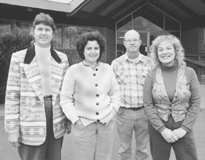

by Terry Kramer

When Cooperative Extension was implemented back in the early 1900s the idea was to get scientific information from the state colleges out to farmers so they could make their land more productive.
"The idea then was to take the research from the 'ivory tower' to the people and say 'This is the best way to plow your field and irrigate to increase production.' It was very production-oriented," according to County Director and Forestry Adviser Kim Rodrigues.
Today, the Cooperative Extension is just as likely to be involved in complex land-use issues or topics of economic development vital to the future of Humboldt County.
Cooperative Extension offers it services for free or a nominal fee. Experts in forestry, livestock and range management, farm and plant science, marine science and 4-H youth development are available. The program is largely funded by the University of California, which pays the advisers' salaries, benefits and training. Some federal and state dollars help fund the program. Humboldt County contributes $65,000 a year to fund office space, salaries of office personnel, utilities and mileage within the county.
"In the early 1900s we more of a rural agricultural society," said Rodrigues. Today, the landowner base is well educated. Crop production is no longer the most important issue any more. Clean air, clean water, soil integrity, endangered species and rural-urban interface are the emerging conflicts that Extension staff must focus on.
"I can teach you how to plant a tree and how to grow the most productive tree, but if I can't help you resolve the conflict of what is associated with harvesting a tree in the future, I haven't done you a whole lot of good," Rodrigues said.
One role Cooperative Extension plays is acting as a neutral third party in conflicts concerning forestry and agricultural land use, according to Deborah Giraud, plant science adviser.
"The U.C. Extension is unique because we can provide unbiased information. We are not selling a product and we are not private consultants trying to keep a job. We provide unbiased, science-based information which is really needed in conflict issues," said Giraud.
Cooperative also offers workshops where speakers from the University of California present lectures on matters of local economic importance. Topics range from sustainable agriculture, viticulture and biological control, to hardwood production and forestry management.
Forestry, marine science, livestock and range advisers also conduct workshops in their respective fields, working directly with the community addressing local concerns. Marine science adviser Susan McBride has offered workshops on watershed and fishery habitat restoration. Gary Markegard, livestock and range adviser, has conducted seminars on developing a training program to aid dairy farmers in learning more about producing quality milk and beef.
Restoring Fieldbrook's Lindsey Creek was a project coordinated by 4-H youth development adviser Teresa McAllister. The project involved surveying the creek to locate fish spawning sites and bank erosion, planting 1,300 evergreen trees and 700 deciduous trees, coordinating a fish incubation project at the elementary school, and assisting with fish surveys and incubating salmon eggs.
"Doing local workshops to make landowners more aware and better land managers is a direct benefit to all of us in the community, I think," said Rodrigues.
Even a simple phone call to the office can provide information on a variety of topics, according to Rodrigues.
"Just in forestry alone we average about 300 calls a month related to forestry issues. They can be from how to start a Christmas tree plantation, or to determine if a tree is sick, to helping to identify a tree, to 'There is a harvest plan in my backyard and I don't like it. What can I do?,'" Rodrigues said.
Home gardeners and landscape/nursery professionals benefit from the information and projects Cooperative Extension offers as well. Currently Giraud is working a biological control project with Sun Valley Floral.
"We are going to be putting out this new Bavaria product. It is a fungus that attacks insects and it is completely organic. We are really excited about that," she said.
The Master Gardener program, a 13-week class taught by Giraud and University of California lecturers, teaches the fundamentals of gardening to both professional landscapers and home gardeners. "The idea is to get science-based gardening information to people and then (have them) extend it to other people in other groups. It is a low-cost class," Giraud said.
Master Gardeners who graduate from the class are encouraged to donate 50 hours of time in community education. They write articles, volunteer at the office with phone inquiries, develop public space gardens, teach at schools and write newsletters, Giraud said. In keeping current with today's trends, Cooperative Extension now offers the community Internet access free of charge.
"We are providing free Internet access for agriculture, horticulture and youth 4-H," said Giraud. "If someone wants to research out herb buyers, or a specific project using the Internet, they are more than welcome to call. I'll show them how to get on and set up," she said.
While Cooperative Extension has evolved to meet current rural economic needs of the community, budget cuts threaten its existence.
"We need Extension more than ever and it is probably threatened more than ever," Rodrigues said. "We are not mandated. We are one of those agencies at risk of being eliminated. Right now we're at a budget that is bare maintenance."
Terry Kramer is a Bayside free-lance writer and owner of Jacoby Creek Nursery.